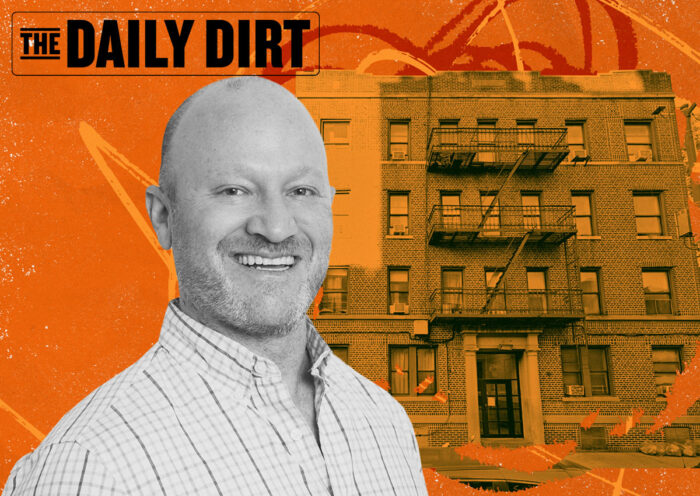NYC Enforcement Program Doesn’t Fix Flatbush Building


There are two kinds of people in this world: those with loaded guns and those who dig.
The rent-stabilized version of that classic movie quote ends this way: those who believe the real estate market can work and those who don’t.
The latter group prefers heavy regulation. When it doesn’t succeed, they blame landlords or regulators — but never second-guess the choice to rely on rules instead of markets.
Take the case of 2500 Bedford Avenue in Brooklyn.
At this 24-unit, rent-stabilized building, the landlord hasn’t kept the tenants happy. He has little financial incentive to do so because the rents are capped at low rates. Tenants likely won’t take their business elsewhere because finding better housing at the same price is virtually impossible.
Maybe the landlord, Jonah Bamberger of Aulder Capital, is cold-hearted — which would be unusual for a graduate of the ultra-progressive Industrial and Labor Relations school at Cornell University, as he is. Maybe the regulated rents are just too low for him to upgrade the aging building or replace its balky boiler.
Which brings us to today’s topic: What happens when the government eliminates market forces, only to have regulation fail in their place?
The pro-regulation crowd’s answer is always more regulation. In this case, it’s the Alternative Enforcement Program, which — as a last resort — allows the city to repair private property itself and bill the owner.
Things got to that point at 2500 Bedford Avenue. But — and this may come as a shock — government takeovers don’t always work.
A spokesperson for the Department of Housing Preservation and Development said inspections at 2500 Bedford found improvements, notably adequate heat, after the city made repairs and fined the landlord $34,000. Yet, tenants still went on a rent strike this winter, citing cold apartments, leaks, mold, rats, electrical issues and fires.
“The fines aren’t working,” said Rajiv Jaswa of Legal Services of NYC, one of the attorneys working with the tenants. “It’s like the cost of doing business.”
In fact, since the Brooklyn building entered into the Alternative Enforcement Program, Jaswa said, the violation count has actually increased. The two sides are now in court. Aulder’s website says it is “repositioning” the property, which it acquired in 2015.
Jaswa blames the landlord, but the story of 2500 Bedford Ave is a reminder that when the government chooses regulation over market forces, and enforcement fails, customers cannot vote with their feet.
What we’re thinking about: City Council members Robert Holden, Kristy Marmorato, Vickie Paladino, Joann Ariola, Susan Zhuang, Inna Vernikov and David Carr, who comprise the Common Sense Caucus, are suing on environmental grounds to stop the City of Yes for Housing Opportunity from taking effect. Do you consider these members environmentalists? Or, if you prefer to answer a different question: Will the City of Yes be good or bad for the environment? Send your thoughts to eengquist@therealdeal.com.
A thing we’ve learned: Lawyers at Boies Schiller sued the city on behalf of building owners seeking compensation for sidewalk sheds that encroach on their property. The firm is seeking class-action status.
Elsewhere…
Luxury short-term rentals startup Rove, based in New York City, says its bookings tripled after a new city law drastically reduced Airbnb listings.
But why? The law cracked down on rentals of shorter than 30 days when the permanent resident is not present. Rove bookings are for 30 days or more, so it doesn’t seem like an Airbnb competitor.
One possible reason that Rove’s business surged is that visitors looking for short-term stays in luxury properties are booking Rove anyway and just not using the full 30 days of the rental.
Previously, they would have used Airbnb, but those listings are largely gone: In September 2023, the new statute knocked the platform’s listings in the city from 23,000 to just 3,700.
Also, some hosts who had been listing on Airbnb surely moved their units to other platforms and required stays of at least 30 days to comply with city (and state) law. One aim of the law is to make more units available for regular tenants, but we have seen no data indicating success on that front.
Closing time
Residential: The priciest residential sale Thursday was $28.5 million for unit 19PHC at 730 Park Avenue. The Lenox Hill co-op apartment last sold in 2019 for $17.5 million.
Commercial: The most expensive commercial closing of the day was $5.7 million for a rental property at 51 West 71st Street. The Upper West Side apartment building is five stories, five units and 5,400 square feet.
New to the Market: The highest price for a residential property hitting the market was $20 million for 7 MacDougal Alley. The Greenwich Village townhome is 4,000 square feet. Compass’ Tim Malone has the listing.
Breaking Ground: The largest new building application filed was for a 57,909-square-foot, 10-story, mixed-use building at 103 East 29th Street. Developer Impact Equities recently acquired the property, scrapping prior plans to build a hotel in favor of this 40-unit project, Yimby reported. Michael Muroff of Michael Muroff Architect is the applicant of record.
— Joseph Jungermann




